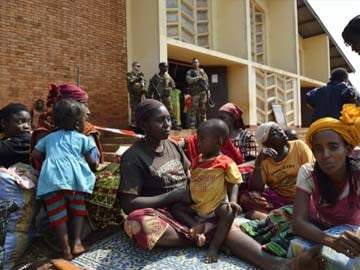
French soldiers taking part in 'Operation Sangaris' stand guard as Muslim people wait to seek refuge at the Boali church, on January 19, 2014, in Boali, some 100km north of Bangui
Bangui (Central African Republic):
Attackers armed with machetes and clubs ambushed a convoy of Muslims fleeing sectarian violence in Central African Republic, killing 22 people, an aid group said today as the country in a state of bloody anarchy awaits a new interim president.
More than 1,000 people have been killed since violence exploded a month ago, and nearly 1 million people have fled their homes.
The rebel leader-turned-president stepped down about a week ago amid mounting criticism of his inability to stem bloodshed some warn could explode into genocide.
On Monday, members of the National Transitional Council are to select a new interim president tasked with leading the country toward democratic elections before the end of 2014.
The field, though, was visibly narrowed by the requirement that candidates could not have taken part in a rebellion or armed group over the last 20 years.
Among eight candidates selected from an initial field of 24 are two sons of former presidents: Sylvain Patasse, whose father was the country's only democratically elected leader and governed from 1993 to 2003; and Desire Zanga-Kolingba, whose father took power in a coup and ruled from 1981 to 1993.
The current mayor of Bangui, Catherine Samba-Panza, is also in the running as is a second female candidate, Regina Konzi-Mongo.
Even as the country moved toward restoring a central government, reports of brutal violence outside the capital continued. Tens of thousands of African migrant workers and their families, mostly Muslims, have tried to flee Central African Republic amid the sectarian clashes.
Today, Save the Children said 22 people had been killed, including three children, while trying to escape.
Spokesman Mike McCusker said doctors described gory scenes and harrowing accounts after gunmen fired a rocket-propelled grenade to halt a convoy of Muslim refugees and then attacked them with firearms, machetes and clubs.
"Our doctor said there was blood everywhere, just pouring out of people like tap water," McCusker told The Associated Press in a telephone interview.
Friday's attack took place in the remote northwest of the country outside the town of Bouar. Nearly the entire population of Bouar, about 40,000 people, is taking refuge in mosques and churches, he said.
"An incident of this magnitude has only come to the forefront because of our internal contacts at the hospital," McCusker said. "Maybe a lot of these stories are not being reported."
More than 1,000 people have been killed since violence exploded a month ago, and nearly 1 million people have fled their homes.
The rebel leader-turned-president stepped down about a week ago amid mounting criticism of his inability to stem bloodshed some warn could explode into genocide.
On Monday, members of the National Transitional Council are to select a new interim president tasked with leading the country toward democratic elections before the end of 2014.
The field, though, was visibly narrowed by the requirement that candidates could not have taken part in a rebellion or armed group over the last 20 years.
Among eight candidates selected from an initial field of 24 are two sons of former presidents: Sylvain Patasse, whose father was the country's only democratically elected leader and governed from 1993 to 2003; and Desire Zanga-Kolingba, whose father took power in a coup and ruled from 1981 to 1993.
The current mayor of Bangui, Catherine Samba-Panza, is also in the running as is a second female candidate, Regina Konzi-Mongo.
Even as the country moved toward restoring a central government, reports of brutal violence outside the capital continued. Tens of thousands of African migrant workers and their families, mostly Muslims, have tried to flee Central African Republic amid the sectarian clashes.
Today, Save the Children said 22 people had been killed, including three children, while trying to escape.
Spokesman Mike McCusker said doctors described gory scenes and harrowing accounts after gunmen fired a rocket-propelled grenade to halt a convoy of Muslim refugees and then attacked them with firearms, machetes and clubs.
"Our doctor said there was blood everywhere, just pouring out of people like tap water," McCusker told The Associated Press in a telephone interview.
Friday's attack took place in the remote northwest of the country outside the town of Bouar. Nearly the entire population of Bouar, about 40,000 people, is taking refuge in mosques and churches, he said.
"An incident of this magnitude has only come to the forefront because of our internal contacts at the hospital," McCusker said. "Maybe a lot of these stories are not being reported."
Track Latest News Live on NDTV.com and get news updates from India and around the world

